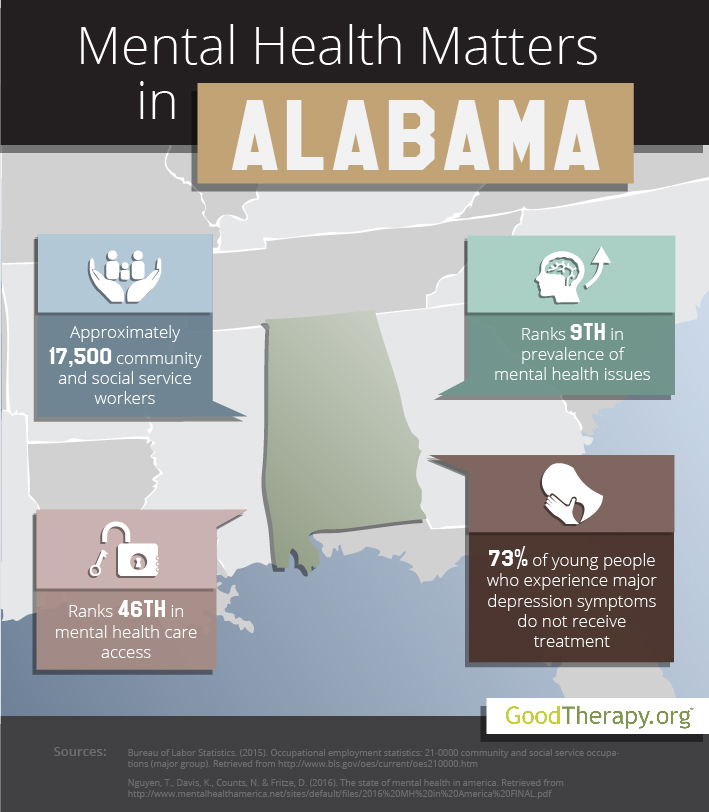Find a Therapist in Alabama
Welcome to the Alabama therapist directory at GoodTherapy.org. Our directory is the fastest and safest way to find a good counselor or therapist in Alabama cities. We only include professional therapists, counselors, and psychologists whose work accords, in attitude and orientation, to the elements of good therapy. Find a therapist or counselor in your Alabama zip code, or click on the links below to see the counselors in your city. If you are looking for telehealth therapy you can click here to see all Alabama telehealth therapists.
Baldwin County
Houston County
Jefferson County
Mobile County
Montgomery County
Mental Health Matters in Alabama
In 2015, the United States Census Bureau estimated that the population of the state of Alabama was approximately 4.9 million people. The Bureau of Labor Statistics reports, of this total, roughly 17,500 individuals worked in community and social service fields. This field includes substance abuse counselors, social workers, marriage and family therapists, clergy, and correctional treatment specialists, in addition to several other related community and social service jobs.
 Mental Health in Alabama
Mental Health in Alabama
Each year, Mental Health America (MHA) conducts a nationwide survey—titled The State of Mental Health in America—to evaluate mental health conditions and practices across the country. The state of Alabama received an overall ranking of 31st out of all 50 states and the District of Columbia in the 2016 edition of this survey.
Alabama was ranked 9th in prevalence of mental health issues—indicating a relatively low prevalence of substance dependence and mental health conditions. Factors that may have contributed to these circumstances include low rates of homelessness, low rates of child maltreatment, and high rates of high school graduation for disabled individuals in the state. Alabama was 13th in overall adult ranking, with a lower percentage of men and women reporting abuse of drugs and alcohol as well as serious thoughts of suicide in comparison to other states.
Despite these statistics, there are several distinct issues researchers and therapists in Alabama may need to address. The 2016 MHA survey listed Alabama in 46th position in the category of access to care, which suggests that residents with mental health concerns may have limited access to the professional care they may require. Certain social factors such as high rates of unemployment, poverty, and obesity may restrict a person’s ability to utilize the residential treatment centers, drug rehabilitation centers, and other mental health resources available within the state. Additionally, approximately 22.6% of adults with mental health issues in Alabama are currently uninsured.
A second area of concern is the state of mental health among young people in Alabama. According to the 2016 MHA survey, Alabama is 39th in overall youth ranking. While the data suggests that a relatively low percentage of young people in Alabama experience severe depression symptoms or depressive episodes, 72.5% of young people who do show symptoms of major depression do not receive any mental health service.
Many clinical studies have highlighted the positive impact therapy may have on lives of individuals with depression. Treatment options such as group therapy, individual therapy, and family therapy have may be beneficial for many people in professional care. Nevertheless, parents must be selective as they seek to find a therapist in Alabama who is able to address the specific needs of their child.
References:
-
Bureau of Labor Statistics. (2015). Occupational employment statistics: 21-0000 community and social service occupations (major group). Retrieved from http://www.bls.gov/oes/current/oes210000.htm
-
Nguyen, T., Davis, K., Counts, N. & Fritze, D. (2016). The state of mental health in America. Retrieved from http://www.mentalhealthamerica.net/sites/default/files/2016%20MH%20in%20America%20FINAL.pdf
-
United States Census Bureau. (2015). Annual estimates of the resident population: April 1, 2010 to july 1, 2015. Retrieved from http://www.census.gov/quickfacts/table/PST045215/01,12001,02
Advanced Search | Browse Locations | International Search